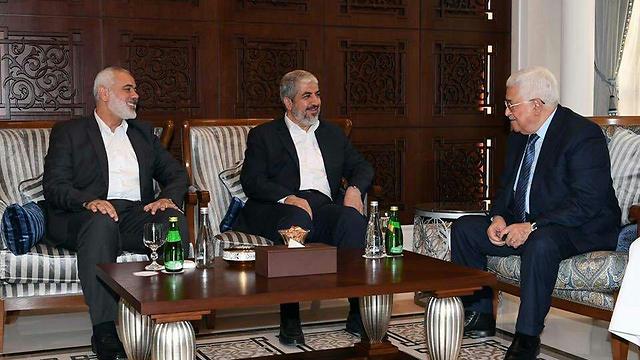Analysis: There is no target date for the appointment of the Palestinian organization’s secretary-general. While Ismail Haniyeh seems to have the best chance, the Hamas parliament could decide to extend Khaled Mashal’s mandate by another year. Meanwhile, Israel and the Palestinian Authority are working in fascinating cooperation against their joint enemy.
Ismail Haniyeh, who is seen as Hamas’ next leader, returned to Gaza on Saturday after a long absence. It was his first trip outside Gaza since the collapse of the Muslim Brotherhood regime in Egypt, the toppling of Hamas’ ally, Mohamed Morsi, and the election of the bitter rival, Abdel Fattah al-Sisi.
For five months, Haniyeh wandered along the Persian Gulf under the unconvincing excuse of a pilgrimage to the holy sites of Saudi Arabia. It’s no secret the pilgrimage is supposed to last a week at most; Haniyeh used his days and nights abroad for consultations on urgent matters in Doha, the capital of the Hamas-friendly emirate of Qatar.

On the agenda was the selection of a replacement-successor for the charismatic Khaled Mashal, the political bureau chief. In Hamas, a clandestine-run organization, this is a long and winding process with no binding target. There is no list of competitors for secretary-general and no election campaign. The Shura Council, a sort of parliament, is familiar with the two leading figures: The veteran Mousa Abu Marzook, who resides in Egypt, and Haniyeh, who has no intention of relocating from the al-Shati refugee camp in the strip. As long as he is in Gaza, the secretary-general will be subject to the Egyptians’ mercy, and al-Sisi’s Egypt will continue to view Hamas as a dangerous organization.
On the one hand, Egypt strives to be part of the picture when it comes to Hamas’ conduct. On the other hand, it is at odds with Hamas’ patrons in Turkey and Qatar. Khaled Mashal and his gang, however, suspect that Egyptian intelligence is receiving Israeli advice regarding the organization’s moves.
Since Morsi’s removal, Egypt has shut down the Rafah crossing, complicated the movement of trucks into the strip and sealed hundreds of smuggling tunnels in a bid to paralyze Gaza’s alternative economy. In such a situation, Israel has a monopoly over the economy of the strip’s two million residents, and the coordinator of the government’s activities in the territory can place their hand on the faucet at any given moment.
If you ask Israeli experts what area they find more troubling—the strip or the West Bank—you’ll receive a sweeping response: Israel is constantly monitoring Hamas’s plans to take advantage of the dual governmentl in the West Bank cities. On the one hand, Palestinian President Mahmoud Abbas has bolstered his status in the political context. On the other hand, his status on the Palestinian street has grown weaker, and Hamas is sparing no efforts to try and create a conflict between the Palestinian Authority and Israel in an attempt to take over the West Bank.
Here’s the first absurdity: Prime Minister Benjamin Netanyahu and Abbas despise each other, but have both declared their desire to resume the peace process while having no faith in any negotiations. Abbas prefers to complain to international institutions, and Netanyahu to approve the construction of thousands of new housing units in Judea and Samaria in order to kill a solution with the Palestinians.
And here’s the second absurdity: With all his doubts regarding Abbas, Netanyahu did not hold back in trying to ensure that the seventh Fatah convention would in fact take place. Israel carried out arrests ahead of the conference to guarantee that Hamas supporters would not torpedo the event. Abbas succeeded, with quite a lot of help from the Israeli supporters of his government, to secure his loyalists in all the senior positions.
If you dig deeper, experts on the situation will insist that Abbas does not support terror, that security coordinations are going on, and that the heads in charge of the security apparatuses have learned to overcome criticism on the Palestinian side. With Hamas as a joint enemy, the efforts against the organization are being carried out under fascinating cooperation.
There is no target date for the appointment of the next Hamas secretary-general. While Haniyeh seems to have the best chance, the Hamas parliament could decide to extend Mashal’s mandate by another year for a variety of reasons: The succession battles among Abbas’ close associates; the war in Syria; the problematic relations with Egypt; the reconciliation with Fatah, which no one is really interested in; and the new president at the White House.
If the Trump administration moves the American embassy to Jerusalem, Hamas will rush to set the West Bank on fire. Israel, for its part, will continue its search for weapon labs in the West Bank and with its waves of nightly detentions. And when the Palestinian street wants Abbas to finally retire, Israel will make sure that Hamas does not raise its head.
As reported by Ynetnews
